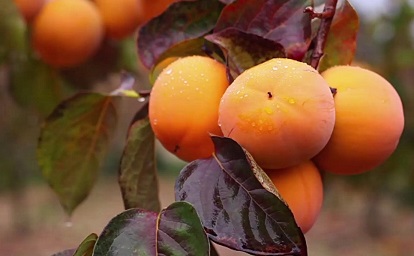Japanese Scientist Demonstrate Antiviral Effect of Persimmon-Derived Tannin Candies Against SARS-CoV-2 Delta Strain
COVID-19 News - Antiviral - Persimmon - Candies - SARS-CoV-2 Delta Jul 28, 2023 1 year, 8 months, 3 weeks, 7 hours, 7 minutes ago
COVID-19 News: The ongoing COVID-19 pandemic caused by the severe acute respiratory syndrome coronavirus 2 (SARS-CoV-2) continues to be a global health crisis. One of the significant challenges in controlling the spread of the virus is its transmission through dispersed saliva. In response to this concern, researchers at Nara Medical University in Japan have been investigating the potential of persimmon-derived tannin as an antiviral agent against SARS-CoV-2, particularly its Delta variant, known for its increased transmissibility and severity.

Tannins are a type of polyphenol found in various foods and have been utilized for their antioxidant and antimicrobial properties. The persimmon fruit (Diospyros kaki) is rich in persimmon-derived tannin, which possesses strong antioxidant, immunomodulatory, antimicrobial, and antiviral activities. Previous studies and
COVID-19 News reports had already demonstrated the effectiveness of persimmon-derived tannin against SARS-CoV-2, including its Alpha variant.
https://www.thailandmedical.news/news/covid-19-news-breaking-japanese-researchers-create-candies-from-tannins-of-persimmon-as-antivirals-against-sars-cov-2
The Delta variant, first identified in England in March 2021, became the predominant strain in Japan by August 2021. This variant has been associated with increased disease severity compared to earlier variants. To combat its transmission, the scientists focused on assessing the antiviral effect of persimmon-derived tannin, both in vitro and in human saliva.
Their initial in vitro experiments showed promising results. Persimmon-derived tannin efficiently inactivated the Delta variant of SARS-CoV-2 in a dose- and time-dependent manner. Interestingly, this antiviral effect was similar to its efficacy against other variants, suggesting that persimmon-derived tannin may be effective against multiple strains of the virus.
To assess its effectiveness in a real-world setting, the researchers turned to tannin-containing hard candy. They enlisted healthy volunteers and COVID-19 patients to consume this candy and then collected their saliva samples. The results were remarkable - saliva samples taken from volunteers while they were eating tannin-containing candy showed significantly suppressed virus titers of the SARS-CoV-2 Delta variant. Furthermore, when saliva samples were collected from COVID-19 patients after consuming the tannin candy, the virus was undetectable using PCR testing for SARS-CoV-2. The antiviral effect of persimmon-derived tannin persisted for at least 60 minutes after consumption.
These findings are particularly significant as saliva is a critical site for SARS-CoV-2 replication, and a high viral load is often detected in saliva, even in asymptomatic individuals. Dispersed saliva can lead to virus transmission during activities such as face-to-face conversations and dining. Thus, reducing the viral load in saliva could potentially help curb the transmission of COVID-19 in everyday situations.
The administration of persimmon-derived tannin
via hard candy offers a simple, safe, and cost-effective method of COVID-19 prophylaxis. The tannin's strong adhesion to cells and viruses ensures that it remains effective for an extended period in the oral cavity.
Although the study shows promising results, it does have some limitations. The exact concentration of tannin in saliva during candy consumption was not assessed, and the number of patients included in the clinical examination was limited. The study was also open-label, potentially affecting the results.
Overall, this research represents a significant step in exploring natural and accessible methods to combat COVID-19. Persimmon-derived tannin presents itself as a valuable candidate for COVID-19 protection, and further research may uncover its potential benefits in other therapeutic applications.
The study team is currently conducting clinical trials involving the newer SARS-CoV-2 sub-lineages that are causing a surge currently in Japan.
The study findings were published in a peer reviewed journal: Viruses.
https://www.mdpi.com/1999-4915/15/8/1636
For the latest
COVID-19 News, keep on logging to Thailand Medical News.
